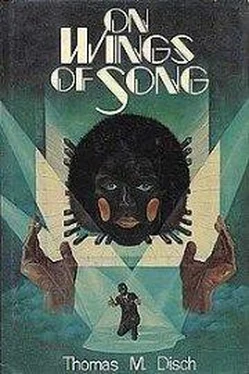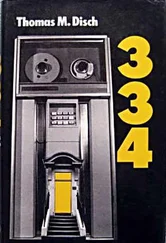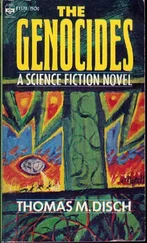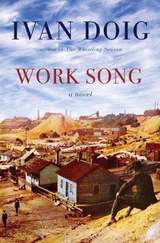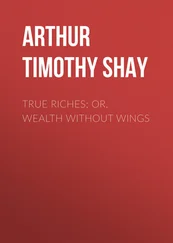He enjoyed himself (and earned a lot of money), but at the same time he didn’t believe in what was happening. A part of him was always backing off from these events and thinking that all these people were insane — Bob, the Lundgren women, the farmers and whores boozing in Elmore. No one in his right mind would want to live a life like this.
Even so, when Bob asked him to come back the next summer, he’d gone back. The money was irresistable, as was the chance for three months to be a grown-up instead of a high school student, than which no form of life is more downtrodden, disenfranchised, and depressed.
Bob was married now, to a girl he’d met in Elmore, and his brother’s widow and her daughter had moved out. Now instead of boozing only on the weekends they were boozing every night. The house had never quite recovered from the elder Mrs. Lundgren’s jihad, and Julie, Bob’s twenty-two-year-old bride did not exert herself in its rehabilitation beyond the point of getting almost all of one bedroom wallpapered. She spent most of the daylight hours in a daze of boredom in front of the tv.
Once, sitting on the back porch on a rainy August night and reminiscing about the good old days at Spirit Lake, Daniel said, “I wonder what ever happened to old Gus.”
“Who?” Bob asked. The tone of his voice had altered strangely. Daniel looked up to see an expression on his friend’s face that hadn’t been there since those times in prison when the subject of his family would get into his bloodstream and bring out the Mr. Hyde in him. There it was again, that same occluded gleam of malice.
“Gus,” Daniel said carefully. “Don’t you remember him? The guy who sang that song the night that Barbara Steiner let go.”
“I know who you mean. What made you think of him just now.”
“What makes a person think of anything. I was daydreaming, thinking about music, I guess — and that started me thinking about him.”
Bob seemed to consider the adequacy of this explanation. The look on his face slowly faded to mild irritation. “What about him?”
“Nothing. I was just wondering what ever became of him. Wondering if I’d ever see him again.”
“I didn’t think he was a particular friend of yours.”
“He wasn’t. But the way he sang made a big impression on me.”
“Yeah, he was an all-right singer.” Bob uncapped another Grain Belt and took a long gurgling swallow.
They both fell silent and listened to the rain.
Daniel understood from this exchange that it was Gus who must have murdered Bob’s father and brother. He was amazed how little difference the knowledge seemed to make in the way he felt about either Bob or Gus. His only concern was to defuse Bob’s suspicions.
“I’d like to be able to sing like that,” he said. “You know?”
“Yeah, you’ve told me on the average of I would estimate once a day. So what I’d like to know, Dan, is why don’t you ever sing? All you have to do is open your mouth and yell.”
“I will. When I’m ready.”
“Dan, you’re a nice guy, but you’re as bad as I am for putting things off to tomorrow. You’re worse — you’re as bad as Julie.”
Daniel grinned, uncapped another Grain Belt, and held it up in a salute. “Here’s to tomorrow.”
“Tomorrow,” Bob agreed, “and may it take its own sweet time in coming.”
The subject of Gus had never rearisen.
When Daniel had left Worry it was six-thirty, but already it had seemed the dead of night. By the time he was home, after the slow drive through the snowstorm, he had expected no more than left-overs heated up. But in fact his mother had waited dinner. The table was set and everyone was watching a panel discussion about the new fertilizers in the living room. They had not waited, the twins in particular, with much good grace, and before Daniel was out of his windbreaker and had given his hands a symbolic splash in the wash basin (saving the water for the toilet tank), they were all of them sitting down and his mother was spooning out servings of tuna fish casserole. Aurelia passed the plate of sliced bread with a look of malevolence. Cecelia giggled.
“You didn’t have to wait dinner for me, you know. I said I’d be home late.”
“Fifteen after seven is not an unthinkable hour for dinner,” Milly said, more for the sake of the twins than for him. “In New York City, for instance, people often don’t have anything to eat before nine, even ten o’clock.”
“Uh-huh,” said Cecelia sarcastically.
“Did you have a nice time?” his father asked. It was rare nowadays that his father asked even so much as that, for Daniel had become protective of his privacy.
Daniel tapped a finger to his mouth, full of the tuna and noodles. The casserole had cooked too long, and the noodles were dry and hard to swallow. “Terrific,” he finally brought out. “You wouldn’t believe their piano. It’s as big as a pingpong table practically.”
“That’s all you did, all afternoon?” Cecelia asked. “Played a piano?”
“And a harpsichord. And an electric organ. There was even a cello, but I couldn’t really do anything with that. Except touch it.”
“Didn’t you even look at the horses?” Aurelia asked. She turned to Milly plaintively. “The horses out there are so famous .”
“Perhaps Daniel isn’t interested in horses,” Milly suggested.
“I didn’t see the horses, but I did see Grandison Whiting.”
“Did you,” said Milly.
Daniel took a meditative sip of milky tea.
“Well?” said Cecelia.
“Was he nice to you?” Aurelia asked, coming right to the point.
“I wouldn’t say nice exactly. He was friendly. He has a big bushy red beard, and a ring on his finger with a diamond on it as big as a strawberry.” He measured the approximate size of the strawberry between finger and thumb. “A small strawberry,” he conceded.
“I knew he had a beard,” said Cecelia. “I saw that on tv.”
“What did you say to him?” Aurelia asked.
“Oh, we talked about a lot of things. Mostly politics, I guess you’d say.”
Milly set down her fork judgementally. “Oh, Daniel — don’t you have a grain of sense?”
“It was an interesting conversation,” he said defensively. “I think he enjoyed it. Anyhow he did most of the talking, and Boa got her licks in, as usual. I was what you’re always saying I should be — an intelligent listener.”
“I’d like to know what’s wrong with talking about politics,” his father demanded. It was Mr. Weinreb’s stated conviction that Daniel’s friendship with the daughter of the richest man in Iowa was not to be regarded as an exceptional occurrence and did not require special handling.
“Nothing,” said Milly, “nothing at all.” She didn’t agree with her husband about this but wasn’t prepared, yet, to make an issue of it. “Cecelia, you eat the peas too.”
“Peas have vitamins,” said Aurelia smugly. She was already on her second helping.
“How’d you get home?” his father asked.
“There was a pick-up coming in to town. They stopped it at the gate. If that hadn’t come along, they were going to send me back in a limousine.”
“Are you going back next Saturday?” Aurelia asked.
“Probably.”
“You shouldn’t overdo it, Daniel,” Milly said.
“She’s my girlfriend, Mom. She can come here. I can go there. It’s that simple. Right?”
“Nothing’s that simple.”
“Why don’t you ask her to dinner with us?” Aurelia suggested.
“Don’t be silly, Aurelia,” Milly scolded. “You’re all acting like Daniel’s never been out of the house before. And by the way, Daniel, there was a phone call for you.”
Читать дальше
